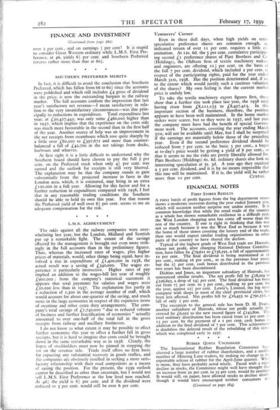L.M.S. ACHIEVEMENT The odds against all the railway companies were
over- whelming last year, but the London, Midland and Scottish put up a remarkable fight. The extent of the savings effected by the management is brought out even more strik- ingly in the full accounts than in the preliminary figures. Thus, whereas the increased rates of wages, plus higher prices of materials, would, other things being equal, have in- volved a rise in expenditure of £1,400,000 in 1938, the actual result was a saving of £340,000. The wages ex- perience is particularly instructive. Higher rates of pay implied an addition to the wages-bill last year of roughly £900,000 ; from the company's statistical statement it appears that total payments for salaries and wages were £20,000 less than in 1937. The explanation lies partly in a reduction of 1,50o in the average number of staff, which would account for about one-quarter of the saving, and much more in the large economies in respect of the expensive items of overtime and other extra duty arrangements. The com- pany's total savings of £1,740,000 " due to reduced volume of business and further fructification of economies " actually amounted to over one-half of the total fall in the gross receipts from railway and ancillary businesses.
I do not know to what extent it may be possible to effect further economies this year to offset a further fall in gross receipts, but it is hard to imagine that costs could be brought down in the same remarkable way as in 1938. Clearly, the hopes of stockholders must now be pinned in stopping the rot on the revenue side. Trade itself offers no firm basis for expecting any substantial recovery in goods traffics, and the companies are obviously justified in seeking a more satis- factory relationship with their road competitors as a means of easing the position. For the present, the 1939 outlook cannot be described as other than uncertain, but I would not sell L.M.S. First Preference at the low level now reached. At 461 the yield is 84 per cent. and if the dividend were reduced to 3 per cent. would still be over 6 per cent.










































 Previous page
Previous page